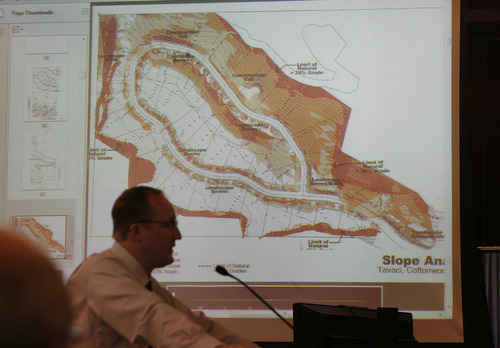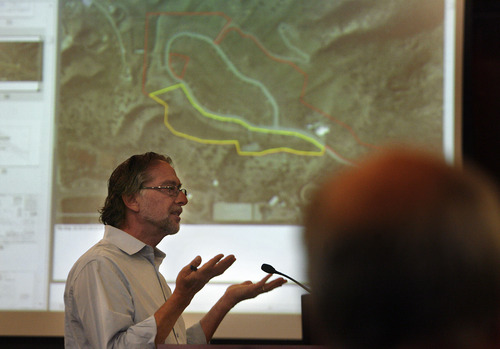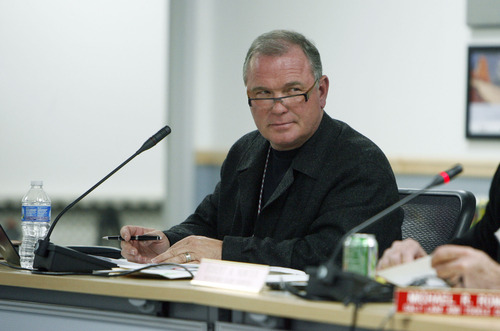This is an archived article that was published on sltrib.com in 2013, and information in the article may be outdated. It is provided only for personal research purposes and may not be reprinted.
Tavaci suffered a setback Wednesday in its first formal proceeding after returning to Salt Lake County's jurisdiction.
While elated, opponents of the controversial development were not doing a victory dance after the County Planning Commission voted unanimously to deny developer Terry Diehl's application for higher density zoning for his 47-acre parcel on a bluff overlooking the Salt Lake Valley from the mouth of Big Cottonwood Canyon.
"Just because the Planning Commission says something doesn't mean the County Council will do what they say," said Roger Kehr, who owns a lot in Tavaci and opposes Diehl's efforts to change the zoning from light-density residential (minimum half-acre lots) to FM-10, which could be used for high-density residential and commercial mixtures in buildings up to 100 feet tall.
But Kehr and Carl Fisher, executive director of the conservation group Save Our Canyons, separately said they expected a Diehl appeal and encouraged Salt Lake Valley residents to contact their County Council members to, in Kehr's words, "let them know that you agree with the Planning Commission's decision."
Their expectations of a continued battle are well founded.
Bruce Baird, an attorney representing Diehl on the zoning issue, said in an email that "the [Planning Commission] was just making a recommendation and we intend to go forward to the County Council."
While Baird was out of town and did not attend the meeting (nor did Diehl), leaving the zone-change promotion to attorney Matthew Muir, Baird added he was "sorry that the [Planning Commission] didn't vote to recommend approval as the county's professional planning staff recommended. Given the number of opponents and their vehemence I can't say that I am surprised."
Opponents were numerous, passionate and long winded in the four-hour meeting.
Besides Save Our Canyons, representatives of the Wasatch Mountain Club and Utah Chapter of the Sierra Club denounced the proposed change. So did government watchdog Claire Geddes. The Salt Lake City Department of Public Utilities weighed in to say the water system servicing the property probably would be insufficient to support denser development.
Holladay City Councilman Jim Palmer objected to the development near his city's southern border, saying it was "a bad idea when first approved by the county in 2004 [and] it's a worse idea now with higher density."
The biggest source of opposition was Cottonwood Heights. Diehl's property was located within its boundaries before he forced the city to let him disconnect last year after its planning commission refused to approve a zoning change that would have allowed him to build the kind of high-density project he is pursuing.
Brian Berndt, the city's community and economic development director, was joined in opposing the latest rezoning bid by Mark Machlis of Cottonwood Heights Voters, with an email list of 600, plus a handful of other neighborhood residents.
For the County Planning Commission, uncertainty about what Diehl wants to do with the property figured prominently in the eight points cited in their decision to reject the rezoning request.
Building heights allowed in the requested zone could go up to 100 feet, an elevation planners felt "would be intrusive and impact mountain views" of people around the valley. They were concerned that only one road accesses the development, a steep "luge run" up from the Big Cottonwood Canyon highway, and that it was not designed to handle a higher density development.
The rejection notice also cited the proposal's incompatibility with the 1992 master plan for Cottonwood Heights, its impacts on wildlife habitat, the belief it was premature until the county finished updating its general plans for the canyons and the negative effects on Kehr, who bought into the development thinking it would become a subdivision. "His opinion should be respected," said commission member Jeff Creveling.
Twitter: @sltribmikeg —
What's next
The applicant can — and said he will — appeal the rezoning denial to the Salt Lake County Council, which has final say on rezoning matters. No date has been set.







